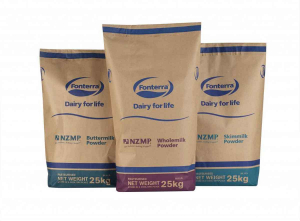Fonterra slashes forecast milk price, again
Fonterra has slashed another 50c off its milk price forecast as global milk flows shows no sign of easing.
 Fonterra chief executive Miles Hurrell says the new earning guidance is a positive start to the year.
Fonterra chief executive Miles Hurrell says the new earning guidance is a positive start to the year.
Fonterra last week lifted its earning guidance for this season but narrowed its forecast farmgate milk price due to softening whole milk powder prices.
The co-op's new earnings guidance is 50-70c/share, up from 45-60c. However, its forecast farmgate milk price range drops from $8.50-$10/kgMS to $8.50-$9.50/kgMS.
The new midpoint for the forecast milk price is $9/kgMS, a drop of 25c, but the co-op is holding its advance rate paid to farmers monthly for milk.
Fonterra chief executive Miles Hurell says it was a positive start to the year given the current global operating environment.
"We continue to feel the impact of geopolitical and macroeconomic events, with higher costs at every point in our supply chain.
"It's a similar story behind the farm gate with our farmer shareholders managing significantly higher input costs."
The co-op reports that globally, milk supply from key exporting regions is down over the last 12 months.
Production in Europe and Australia continues to be down, with US milk supply showing a slight improvement in recent months. In New Zealand, Fonterra's milk production is down 2.9% on the same point last season.
"Global market volatility has prompted some softening of demand for whole milk powder, particularly in Greater China, and this is reflected in our forecast farmgate milk price range," says Hurrell.
"We've seen increased participation from other regions, which has offset in part the drop in demand from Greater China. While it's still early in the financial year, we are happy with our sales contract rate."
Hurrell says the long-term outlook for dairy remains strong.
"There's no doubt that we're in a period of increased global uncertainty.
"Inflationary pressures are bing felt both on farm and across our business but looking further out, the fundamentals for dairy remain positive."
Legal controls on the movement of fruits and vegetables are now in place in Auckland’s Mt Roskill suburb, says Biosecurity New Zealand Commissioner North Mike Inglis.
Arable growers worried that some weeds in their crops may have developed herbicide resistance can now get the suspected plants tested for free.
Fruit growers and exporters are worried following the discovery of a male Queensland fruit fly in Auckland this week.
Dairy prices have jumped in the overnight Global Dairy Trade (GDT) auction, breaking a five-month negative streak.
Alliance Group chief executive Willie Wiese is leaving the company after three years in the role.
A booklet produced in 2025 by the Rotoiti 15 trust, Department of Conservation and Scion – now part of the Bioeconomy Science Institute – aims to help people identify insect pests and diseases.